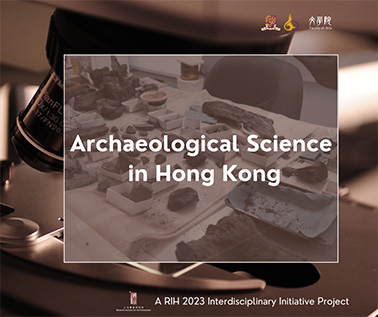Archaeological Science in Hong Kong
A RIH-funded Interdisciplinary Research Project
This initiative facilitates dialogue and knowledge exchange on a wide range of topics related to the human past. Researchers can share the latest developments in their respective fields through themed technical workshops and focus group meetings. Ultimately, this initiative will help advance the study of the human past by strengthening the collaborative network to address research interests more effectively.
Hyperlink to the project website
Project team
- Christina CHEUNG (Assistant Professor, Department of Anthropology, CUHK)
- Dr. Reijiro AOYAMA (Senior Lecturer, Department of Japanese Studies, CUHK)
- Prof. David Michael BAKER (Associate Professor, School of Biological Sciences, HKU)
- Mr. Alexander CHEUNG (Vice Chairman, Hong Kong Archaeological Society)
- Ir. Dr. LAI Wai-Lok, Wallace (Associate Professor, Department of Land Surveying and Geo-informatics, The Hong Kong Polytechnic University)
- Prof. LAM Weng Cheong (Associate Professor, Department of History/Anthropology, CUHK)
- Prof. PENG Peng (Assistant Professor, Department of Fine Arts, CUHK)
- Dr. TAM Pui Yuk Tammy (Senior Lecturer, Department of Earth and Environmental Sciences, CUHK)
- Prof. Benoit THIBODEAU (Assistant Professor, Department of Earth and Environmental Sciences, CUHK)
- Prof. Wicky TSE Wai Kit (Associate Professor, Department of History, CUHK)
- Dr. WONG Wai Kai (Lecturer, School of Biomedical Sciences, CUHK)
- Ms. Julie VAN DEN BERGH (Director, Archaeological Assessments Ltd, HK)
- Prof. Leilah VEVAINA (Assistant Professor, Department of Anthropology, CUHK)
- Prof. ZHANG Chaoxiong (Assistant Professor, Department of Anthropology, CUHK)
Project objectives
• To promote intra- and inter- faculty collaborations in CUHK, presenting new opportunities to enhance the research portfolio and impact of the Faculty of Arts.
• To promote the fields of Archaeology and Archaeological Science in Hong Kong.
• To initiate the first focus workgroup on CUHK campus that bridges the Arts (Anthropology/History) with the Sciences (Life Sciences/Material Sciences).
• To connect researchers who share similar research interests in the human past but possess different relevant skills.
• To provide a supportive platform where larger transdisciplinary projects can emerge.
Project brief description
The field of archaeology has undergone tremendous change in recent years. Particularly, advances in scientific methods and an increasing institutional push for interdisciplinarity have enabled and encouraged archaeologists to explore new ways to reconstruct the past. These state-of-the-art technologies have revolutionised the way we learn about the past, opening up areas of human history previously inaccessible using conventional methods. We can now take our investigations to an entirely new level of detail and accuracy, from intimate details such as the eye and hair colour of someone who lived thousands of years ago , to global concerns such as past climatic events , . Recent research demonstrates the successful use of scientific methods in addressing social issues such as social stratification, gender dynamics, trading networks, and cultural changes in past societies , , . Moreover, in addition to learning about how our ancestors lived, archaeology also has direct and indirect relevance for current issues. For example, by looking at recovery patterns of past populations from various crises (e.g. climate change , epidemics , or wars and forced displacements ), we can provide valuable information to help inform decision making on how best to implement polices relating to emergencies in modern times. Furthermore, archaeological methods may also find utility in other related fields, including but not limited to forensic recovery of human remains , wildlife trafficking , and biodiversity studies . Therefore, there is both the need and urgency to continue developing archaeological sciences. Consistently ranked as one of the world’s best research institutes, CUHK would be the perfect host to lead such an innovative initiative in Asia.
Despite having proved to be immensely successful in many other countries, the implementation of scientific methods in archaeological research is still not routinely practiced in Hong Kong. Fortunately, researchers with related expertise and interests, as well as required equipment and analytical facilities can be found across universities in Hong Kong. Hence, this initiative intends to bring together a team of researchers and practitioners with shared interests in using or developing scientific methods in archaeology, providing an arena for us to share and exchange ideas, experiences, and findings. This first (to hopefully more) initative will focus on two themes, bioarchaeology (i.e. health, diet, and mobility) and material science (i.e. metal and ceramics).
Instead of all working on one project, this initiative will focus on building synergies between researchers across very different fields. In a round-table setting, researchers will engage in discussions and hands-on demonstrations, providing comments and insights on each other’s research projects based on their respective specialised backgrounds. The goal is to explore new interdisciplinary perspectives that can enhance all of our ongoing projects. We expect this effort will inspire, encourage, and guide all participants to design trans-disciplinary collaborative projects. Last but not least, while the current initiative only focuses on connecting researchers in Hong Kong, it is hoped that the success of this effort will serve as a springboard for larger collaborations with researchers beyond Hong Kong in the near future.
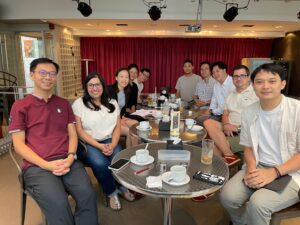
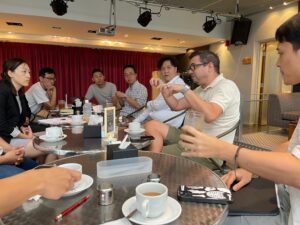
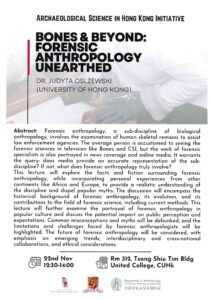
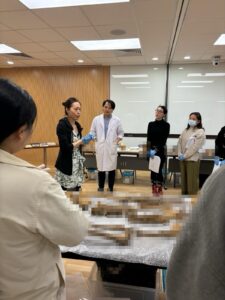
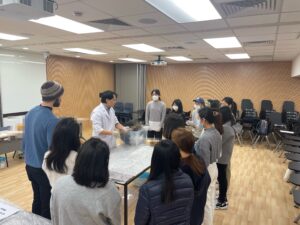
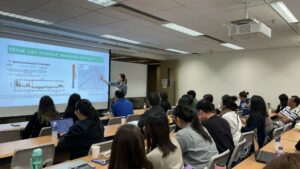
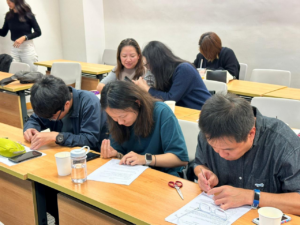
(4 & 8 Mar. 2024, CUHK) A two-day workshop titled “What You Eat: Applications of Biochemical Methods in Archaeology” attracted over 30 participants from various departments across HK, including students and scholars from Anthropology, Biological Sciences, Cultural and Religious Studies, Philosophy, Public Health, and more. After an introduction to the basic principles of the method, participants prepared their own hair for stable isotope analysis and learned to use the program R to plot their data. We then had an exciting discussion on the meaning of the data and how it can help us understand the food practices of a society. The generated data will also be used for a student’s FYP!
(2 Jun. 2024, HKU) Glass Artefacts and The Maritime Trade: Archeological Glass from South China Sea Coast and HK Collection
Dr. Kuan-Wen Wang from the Academia Sinica, Taiwan, to come and share her research on ancient glass with us. This event will take the form of a lecture and workshop and will take place on the 2nd of June (Sunday) from 14:00 – 16:30 at G/F, Fung Ping Shan Building, University Museum and Art Gallery, HKU (Sai Ying Pun). More information.
Registration link: https://bit.ly/glassevent (Limited seats, priority is given on a “first-come, first-serve” basis)
(31 July 2024, CUHK) Exploration of Microscopic World of Artifacts: XRF & SEM-EDS
In this lecture cum workshop event, Prof. LAM Weng Cheong, CUHK (HIS, ANT) will show the participants the different analytical techniques archaeologists employ to understand the chemical compositions of (inorganic) artefacts.
Lecture: 2 – 3 pm @ NAH401, New Asia College
Workshop: 3:15 – 5pm @ 1/F Science Center North Block
FREE event, all are welcome. Limited seats, please register now! Registration link: https://cloud.itsc.cuhk.edu.hk/mycuform/view.php?id=2474792
(21 & 28 Oct 2024, CUHK) Introduction to Archaeobotany: What plants can tell us about the past
The main event will be a lecture taking place on the 21st Oct (Monday), from 14:30 – 16:15 at UCC-C2, T. C. Cheng Building, United College, CUHK. We are very fortunate to have Prof. Jennifer Bates from Seoul National University to come and share her research on ancient plant remains with us. Participants can also opt to attend a hands-on session (21/10 17:30 – 18:15) and a follow up info session for the practical (28/10 14:30 – 16:15). As usual, the workshop is free and open for all to participate! Please register if you are interested to attend, and feel free to share
(1 Apr. 2025, CUHK) Living and Dying during Wars and Epidemics – New Bioanthropological Perspectives from Medieval Northern Italy
Dr. Elena Fiorin from Sapienza Università di Roma, Italy will give a talk on her research in Medieval Italy. This talk will combine archaeological and bioanthropological methods to examine how war and pandemics affected urban communities in the past. More information.
FREE event, all are welcome. Limited seats, please register now! Registration link: https://cloud.itsc.cuhk.edu.hk/mycuform/view.php?id=3300072%20.
(8 Oct. 2025, CUHK) Extended Reality in Archaeology
Prof. Peter J. Cobb, Prof. Lukas Z. Liu, Mr. Hayk Azizbekyan, and Ms. Wuyan Yao from the University of Hong Kong to give a talk and demonstration on the use of virtual reality (VR), augmented reality (MR) and mixed reality (MR) in archaeology. More information
FREE event, all are welcome. Limited seats, please register now! Registration link: https://cloud.itsc.cuhk.edu.hk/mycuform/view.php?id=2212319


